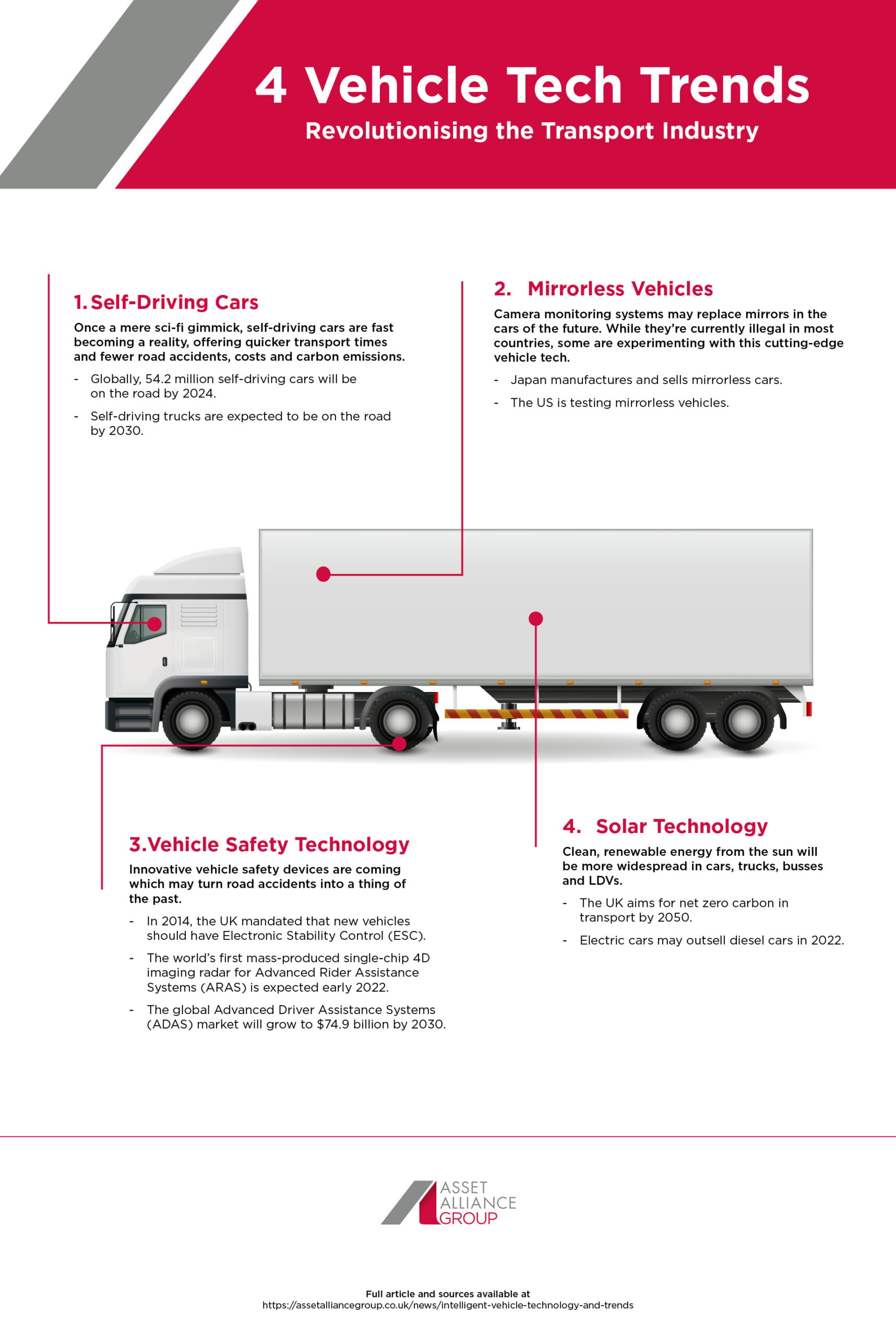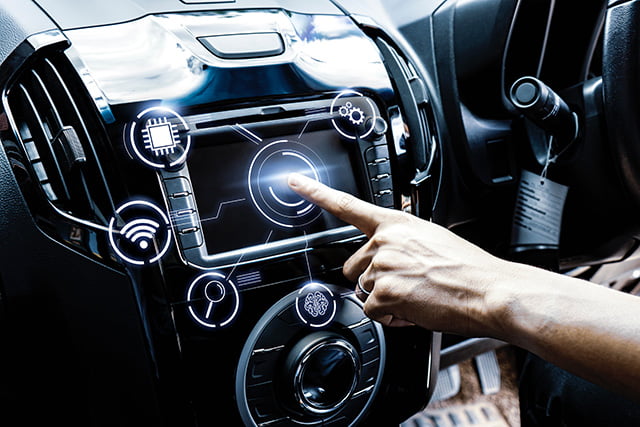Mirrorless, self-driving vehicles fuelled by the sun might sound like something from a sci-fi film, but they’re fast becoming a reality.
Innovative vehicle technology makes our roads safer, our fuel cheaper and our planet greener. Not only that but the UK’s Transportation and Storage sector is now the eighth-fastest growing sector in the country and the second-ranked sector for business growth in the past five years. This growth is propelled by high-tech vehicle trends.
We discover the emerging vehicle tech trends shaping the industry in the years to come, which will be essential to stay ahead of the curve in the demanding transport and logistics sector.

Self-Driving Cars
The number of self-driving cars with at least Level 1 autonomy is projected to grow from an estimated global total of approximately 31.4 million in 2019 to around 54.2 million in 2024. The UK is at the forefront of adopting self-driving tech, being ranked 9th out of 30 countries for its “autonomous vehicle readiness”. The market for self-driving vehicles in the UK is set to be worth nearly £42 billion by 2035.
While there is a lot of public interest in self-driving private cars and the industry has largely been focused on cars and taxis until now, the focus on driverless trucks and transport is gradually ramping up. Scania is just one example of a global market leader in the transport sphere implementing self-driving trucks as part of their comprehensive autonomous solutions initiatives.
Key benefits of this vehicle tech trend (for drivers and businesses) include:
- Quicker transport times
- Fewer work-related road accidents
- Reduced costs associated with road accidents (repairs, medical expenses, etc.)
- An overall smoother process for fleet operations
- Reduced congestion and carbon emissions
- Reduced reliance on short-haul flights
- More independence and freedom of movement for drivers with disabilities
Google Trends has revealed recent spikes in interest around the topic of self-driving cars, as shown below:

Fully automated driving could also be on track to arrive in the UK in the next year.
Mirrorless Vehicles
The cars and trucks of the future may all be mirrorless if this emerging tech and design trend gains traction. Which it just might: data from Google Trends reflects a growing interest in mirrorless cars worldwide:

Mirrorless vehicles are designed without any rear-view or side-view mirrors, and instead have camera monitoring systems in their place. These systems are designed to show footage of the vehicle’s surroundings, with a wider view that eliminates the blind spots associated with vehicle mirrors.
Mirrorless vehicle designs are still illegal in most countries, putting the UK – where such vehicles are in use – at the bleeding edge of this technology. Mirrorless Mercedes Benz Actros trucks have been on the road in the UK since 2019.
Accompanying the UK in being at the forefront of this innovative tech, Japan passed a law in 2016 allowing automakers to manufacture and sell mirrorless cars. More recently, the U.S. Department of Transport started testing the viability of mirrorless vehicles.
Vehicle Safety Technology
Road safety is an ongoing concern and tech innovations can go a long way towards reducing accidents, injuries and deaths caused by human error. The top automotive safety technology trends include:
Electronic Stability Control (ESC): Computerised technology that detects when a driver has lost steering control and engages the brakes to reduce skidding. Vehicles equipped with ESC are 25% less likely to be involved in a fatal accident than those without.
Did You Know? In 2014, the UK mandated that all new vehicles should be built with ESC.
Advanced Driver Assistance Systems (ADAS) features: Automated safety features designed to reduce human error, such as pedestrian detection, road sign recognition, automatic emergency braking, blind spot detection and more. It’s been predicted that the global ADAS market will grow to $74.9 billion by 2030.
Did You Know? The European Union revised the vehicle General Safety Regulation in 2019, to make several advanced safety features mandatory for both light and heavy vehicles. Several ADAS features will be compulsory as of July 2022, and it’s been predicted that these measures could help to save over 25,000 lives and avoid at least 140,000 serious injuries by 2038. ADAS vehicles are also becoming more common.
Advanced Rider Assistance Systems (ARAS) features: Automated safety features for two-wheeler vehicles, designed to reduce human error and road accidents. Israeli company Vayyar has created the world’s first mass-produced single-chip 4D imaging radar for ARAS, due to be released in early 2022.
Solar Technology
Incorporating solar panels into the design of trucks, buses and LCVs reduces the vehicle’s need to burn fuel, by harnessing clean renewable energy from the sun. Brands like TRAILAR are pioneering this trend by providing flexible, durable and ultra-thin solar mats that can easily be fitted to existing fleets.
We can see a clear upward trend in UK searches for solar vehicles, as shown below.

Electric cars are expected to outsell diesel cars in the UK during 2022. Industry insiders are predicting that a total of 260,000 electric cars will be sold in 2022, compared to 221,000 diesel models. Correspondingly, the electric truck market is expected to grow 14.3% by 2026.
The future looks bright for solar technology and transport. TRAILAR has contributed to the UK National Decarbonisation Plan, which aims to drive the country’s transport industry to net zero by 2050. They also predict we could see the development of solar vehicles in the near future.
The future of transport is fast approaching
“At Asset Alliance Group, we are continually monitoring technology advances manufacturers are bringing to the market. Corporate social responsibility in tandem with reduced costs of vehicle ownership and operations remains a central plank of widescale technology adoption. Globally, vehicle manufacturers move closer to this every year.
The pace of innovation is truly exciting in both safety and decarbonisation. We are in no doubt that over the next five years, the car and LCV market will be very different, especially in electric-powered vehicles. The bus sector is already rapidly adopting gas and battery options and takes the lead in cutting emissions in urban areas. Meanwhile, the logistics and haulage sector requires longer to make this change simply due to the nature of their heavy payloads and long-distance trunking needs. This sector requires solutions that are not ready just yet, but that will come in the future.
It is remarkable to imagine how this will play out over the next ten years. The process towards effective decarbonisation and enhanced safety features across the entire motor sector is already well underway. We have good reason to be excited about the future that lies ahead of us.” – Grant Law, Marketing Director, Asset Alliance
These exciting cutting-edge trends are set to keep the roads safer and make business more profitable for professionals across the transport industry.
If you’re in the transport industry and looking to stay on top of the latest UK transportation trends, visit the country’s leading commercial vehicle finance provider for advice.

